I'm busy with a proof of concept working with a triple store. I have the following structure:
There are 2 relation types defined (triples). Top-down relation where the child is part of ("isPartOf" its parent and left-right where there are childs that CAN (optional) be replaced ("replaces") by another version of the child.
Also every child have a "isValidStart" triple with a date as object. This means that this child is valid since that date. The last child in a horizontal childgroup can have a relation "isInvalidEnd" that means that after this date this group is invalid.
What I want to do is to build a SPARQL query where I can get the childs of a parent on a specific date. Is that possible with SPARQL and how can I do that?
I know that there is in Oracle any kind of START WITH / CONNECT BY function that do some kind of this stuff...but how do I this in SPARQL world.
Thanks
</metadata/puid/test2> <http://purl.org/dc/terms/isPartOf> "/metadata/puid/test1" .
</metadata/puid/test2> <http://purl.org/dc/terms/isValidStart> "2015-04-01"^^<http://www.w3.org/2001/XMLSchema#date> .
</metadata/puid/test3> <http://purl.org/dc/terms/isPartOf> "/metadata/puid/test2" .
</metadata/puid/test3> <http://purl.org/dc/terms/isValidStart> "2015-04-01"^^<http://www.w3.org/2001/XMLSchema#date> .
</metadata/puid/test4> <http://purl.org/dc/terms/isPartOf> "/metadata/puid/test3" .
</metadata/puid/test4> <http://purl.org/dc/terms/isValidStart> "2015-04-01"^^<http://www.w3.org/2001/XMLSchema#date> .
</metadata/puid/test5> <http://purl.org/dc/terms/isPartOf> "/metadata/puid/test4" .
</metadata/puid/test5> <http://purl.org/dc/terms/isValidStart> "2015-04-01"^^<http://www.w3.org/2001/XMLSchema#date> .
</metadata/puid/test6> <http://purl.org/dc/terms/isPartOf> "/metadata/puid/test4" .
</metadata/puid/test6> <http://purl.org/dc/terms/isValidStart> "2015-04-01"^^<http://www.w3.org/2001/XMLSchema#date> .
</metadata/puid/test7> <http://purl.org/dc/terms/isPartOf> "/metadata/puid/test4" .
</metadata/puid/test7> <http://purl.org/dc/terms/isValidStart> "2015-04-01"^^<http://www.w3.org/2001/XMLSchema#date> .
</metadata/puid/test8> <http://purl.org/dc/terms/replaces> "/metadata/puid/test7" .
</metadata/puid/test8> <http://purl.org/dc/terms/isValidStart> "2015-07-01"^^<http://www.w3.org/2001/XMLSchema#date> .
</metadata/puid/test9> <http://purl.org/dc/terms/isPartOf> "/metadata/puid/test5" .
</metadata/puid/test9> <http://purl.org/dc/terms/isValidStart> "2015-04-01"^^<http://www.w3.org/2001/XMLSchema#date> .
</metadata/puid/test10> <http://purl.org/dc/terms/isPartOf> "/metadata/puid/test5" .
</metadata/puid/test10> <http://purl.org/dc/terms/isValidStart> "2015-04-01"^^<http://www.w3.org/2001/XMLSchema#date> .
</metadata/puid/test11> <http://purl.org/dc/terms/isPartOf> "/metadata/puid/test5" .
</metadata/puid/test11> <http://purl.org/dc/terms/isValidStart> "2015-04-01"^^<http://www.w3.org/2001/XMLSchema#date> .
</metadata/puid/test12> <http://purl.org/dc/terms/replaces> "/metadata/puid/test9" .
</metadata/puid/test12> <http://purl.org/dc/terms/isValidStart> "2015-07-01"^^<http://www.w3.org/2001/XMLSchema#date> .
</metadata/puid/test13> <http://purl.org/dc/terms/replaces> "/metadata/puid/test10" .
</metadata/puid/test13> <http://purl.org/dc/terms/isValidStart> "2015-05-01"^^<http://www.w3.org/2001/XMLSchema#date> .
</metadata/puid/test14> <http://purl.org/dc/terms/replaces> "/metadata/puid/test13" .
</metadata/puid/test14> <http://purl.org/dc/terms/isValidStart> "2015-08-01"^^<http://www.w3.org/2001/XMLSchema#date> .
</metadata/puid/test14> <http://purl.org/dc/terms/isValidEnd> "2015-12-01"^^<http://www.w3.org/2001/XMLSchema#date> .
// disclaimer: I'm new in SPARQL world
